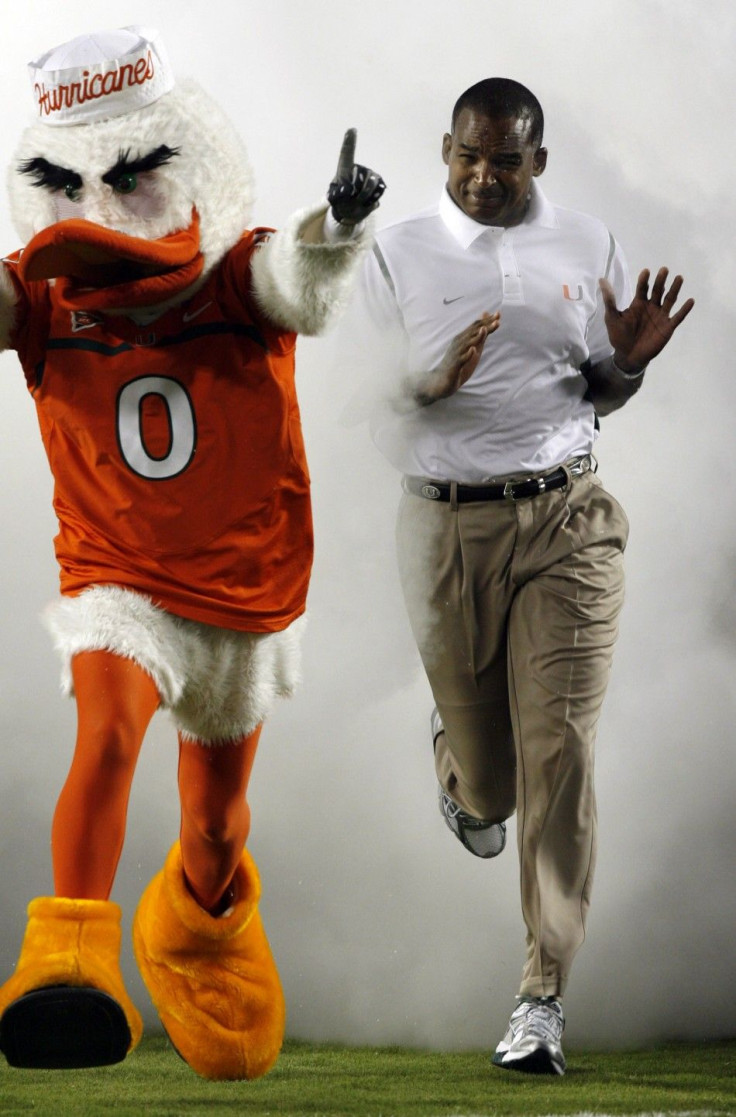Miami Hurricanes Scandal: The NCAA Has a Much Bigger Problem
OPINION

Pundits are calling it a shocking sports story -- allegations from a former booster and subsequent NCAA investigation that University of Miami football players received millions of dollars in improper benefits including gifts of money, jewelry and prostitutes over the course of eight years.
But anybody that's been around college athletics closer than a seat in the stands likely isn't truly surprised at all by the allegations and investigation. Maybe some of the details of how it happened are surprising. Fueled by Nevin Shapiro, a former Miami businessman currently doing a 20-year stint in federal prison for fraud, the seedy story makes for good tabloid fodder.
At the core, however, allegations of booster money and enticements showered upon players at a big-time football school is about as big of a non-story as we could get. Read here: BCS football teams beyond Miami have been littered for years and years with under-the-table money, performance-enhancing steroids, and general corruption of all sorts that violate the NCAA's pristine, well-intentioned rules.
The NCAA just pretends it isn't so, until someone like Shapiro forces them to deep a deeper look into their own dungeon.
Big-time college football is a big business. That's why University of Alabama coach Nick Saban earns more than $10 per year. The Crimson Tide is a collegiate program, made up of amateur athletes, yet the coach makes more than most CEOs? This isn't your mother's YMCA.
The NCAA is arguably the biggest joke of a do-right veil this nation has ever seen. They talk a good game, about the virtues of student-athlete advancement. And certainly, in many NCAA sports, and with many NCAA athletes, it does happen that way. A child of mine ran Division 1 track for a Southeastern Conference school, and the experience from all reports was as golden as one would hope.
No money -- just hard work for the right reasons. But when it comes to BCS football programs, and in many cases basketball programs, the rules of the NCAA game change, drastically. When tens of thousands of boosters fill stadium seats and fund-raising coffers, money means more than the NCAA's ideals.
THE NCAA TURNS THE OTHER WAY (UNTIL FORCED TO FACE THE FACTS)
Think Reggie Bush getting money at USC while he won the Heisman Trophy was an isolated incident? No, he was one of just many players who received improper benefits according to NCAA rules when that team won national championships. Ask some former players, some will tell you the truth.
The same thing happens at Auburn. The same thing happens at Florida State. The same thing happens at Oregon. The list could continue -- as many players at BCS schools get cash and benefits from boosters on a regular basis. And we're not talking small dollars, either.
Steroid use by players at the BCS schools is rampant as well, though the NCAA tries to dodge that one too. Sure, schools have random testing. But athletes today know how to avoid positive test results. Coaches don't cry foul, either. If a player gains 25 pounds of mostly muscle over the summer they are happy to attribute it all to good weight work and look the other way.
They know better, though. It just takes a lot to earn those big paychecks and make the Top 25 rankings. Primarily, it takes big, strong players -- and they don't care how they get there. They just want to win.
Once upon a time, the NCAA tried to clean up college football. The agency aggressively went after programs with investigations, making high profile sanctions, including one against SMU in the 1980s resulting in the death penalty of the program until it was restored years later.
But that type of action was bad for business -- college football's money business. Didn't have any impact on academics, of course. But it wasn't good for the made-for-television game -- accusations of dirty business and all. And SMU's death penalty messed up scheduling. It was too financially and brand-power costly.
So the NCAA began after the SMU case to look the other way, except when reports corruption become like Miami's -- so blatant and severe that it's impossible to ignore.
And even then, the organization doesn't really know what to do. If the assertions are true, the conduct at the University of Miami is an illustration of the need for serious and fundamental change in many critical aspects of college sports, said NCAA president Mark Emmert in a statement.
IT'S ONLY A (MONEY) GAME
That may be the understatement of the college sports century. As if he didn't already know of the need for serious and fundamental change in many critical aspects of college sports. Most fans closely tied to big-time college football have long known just as the NCAA as known of the deep lines of corruption that exist within the game.
We could call it the game's dirty secret, if it really were a secret. No, that cat has been long out of the bag.
NCAA officials, just like the coaches, simply pretend to look the other way -- if they don't see it, it doesn't happen.
Besides, fans don't care if their school's players get paid. They just want to win, for the most part. The NCAA honestly does care, I think. But the problem is bigger than they can manage. The schools rake in millions and millions of dollars, earned by players who get nothing on the table but scholarships and book and meal money.
Under the table, however, top stars are getting more at the big schools -- much more. And it's not just at the University of Miami. Big-time college football is a money game, a grand illusion that's beyond the NCAA's control. And it's been that way for many years now.
© Copyright IBTimes 2024. All rights reserved.











